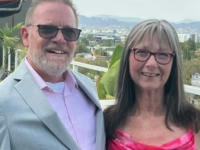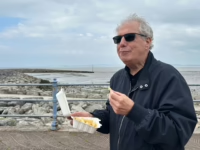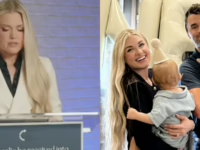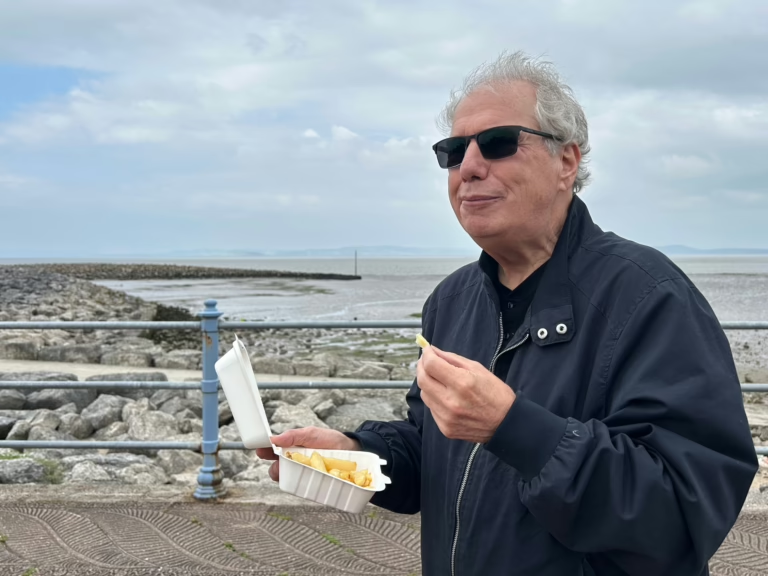This article addresses sensitive topics including suicide and assisted dying.
Morecambe, United Kingdom – On a gray July morning, an hour before our meeting at Lancaster train station, 71-year-old Alex Pandolfo sends a WhatsApp message.
He admits that despite our video chat two weeks prior, he can’t recall my face. “I hope you don’t find this rude… If you see me, just give me a nudge,” he jokes.
When I find him on the platform, he pauses briefly before a cautious smile spreads, growing as he recognizes me.
To ensure he arrived on time, Pandolfo had set multiple alarms the night before. When the first alarm sounded at 7 a.m., he got up and glanced at a painting of Morticia Addams by a close friend and a Humbug candy plush his sister gave him as a playful jab at his dislike of Christmas. “Every morning is a gift,” he reflects, “and it’s comforting to wake up surrounded by reminders of those I cherish.”
After brewing coffee and checking emails, another alarm prompted him to leave for the station. These alerts, synced with his phone calendar, guide him through his day and remind him of appointments. “New names and faces are tough for me to remember,” he explains. “I find it easier to recall things from long ago.”
Embracing Life Without Fear of Death
In 2015, Alex was diagnosed with Alzheimer’s disease, the leading form of dementia characterized by gradual cognitive decline, memory loss, language difficulties, and changes in mood and behavior. Currently, no cure exists.
At 61, doctors estimated he had three to four years to live, possibly up to ten, but likely with severe cognitive impairment requiring full-time care. Disease progression varies widely; some live five to eight years post-diagnosis, while others survive two decades.
Remarkably, Alex’s condition has remained relatively stable over the past ten years. “I can’t explain why,” he says with a wry smile. “The brain is a mysterious organ.”
To manage daily tasks, he sets about ten alarms on days with planned activities. These reminders prompt him to shop, revisit tasks, or prepare for meetings, including alerts naming the person he’s meeting. When cooking, his Alexa device signals when to check the oven or start chopping vegetables. “If I’m hosting dinner, I jot down the menu on my phone’s Notes app but delete old notes to avoid confusion,” he shares.
Besides hosting friends and family, Alex stays engaged by organizing events for the local Manchester City fan club and participating in protests supporting Palestine and migrant rights in Lancaster. On warm days, he enjoys sitting by the nearby seaside, feeling the breeze as alarms intermittently sound.
Yet, he knows there will come a time when alarms won’t suffice. Having surpassed his initial prognosis, Alex cherishes each day but remains aware that a sudden decline could occur at any moment.
When that day arrives, as a passionate advocate for assisted dying, he does not wish to prolong life without quality.
“I’ve never feared death,” he states firmly. “What scares me is losing my quality of life.”

The Freedom to Choose
Alex lives independently in a tidy, single-story home nestled in a leafy Morecambe neighborhood. His living room walls are adorned with vibrant concert posters from legendary bands like Fleetwood Mac, Pink Floyd, and Led Zeppelin-each a gateway to cherished memories that brighten his eyes. “I was 11, ice skating in Manchester,” he recalls. “Barry McGuire’s ‘Eve of Destruction’ played-a song about conflict and war, especially in the Middle East. The bass drum sounded like a motorcycle revving. It moved me so deeply I stopped skating and started to cry.”
He estimates attending thousands of concerts, with his favorite being Cat Stevens at the Manchester Opera House in 1972.
“Music is the pulse of life,” Alex explains. For him, it also carries political significance.
“It’s in my veins,” he adds with a grin. “My mother’s family is Irish, my father’s Italian. I grew up listening to anti-Mussolini and Irish Republican songs.”
He points to posters of the musical Hair, which profoundly influenced his worldview. The show, set during the Vietnam War draft in New York City, explores the tension between individual freedom and societal expectations. “When I first saw it, I was blown away,” he says. “It shaped my belief in everyone’s right to be themselves and live freely.”
This philosophy fuels his support for assisted dying as a form of autonomy. While he remains active, Alex plans to travel to Basel, Switzerland, where assisted dying (though not euthanasia) is legal. He has already received approval from a Swiss assisted dying organization to end his life on his terms. “Having this choice lets me embrace life more fully,” he says.

A Story of Fierce Love and Loss
At 14, Alex was expelled from school after headbutting a geography teacher who insulted his father, Vincent. He laughs recalling how his father calmly picked him up from the bus stop afterward, unfazed by the incident.
However, his tone darkens when discussing his parents’ battles with dementia-Vincent diagnosed in 1999 at 70, and Marie in 2017 at 84. Witnessing their decline solidified Alex’s conviction about assisted dying. “They lost not only their memories but their dignity, freedom, and sense of self,” he says.
Alex shared a close bond with Vincent, working alongside him after school. They spent days driving, listening to the radio, and delivering coal.
“Dad was incredibly fit,” Alex recalls. “He ran a marathon at 65. So when he developed multiple system atrophy in 1996 and dementia three years later, it was heartbreaking. He couldn’t run, drive, or do what he loved.”
Dementia transformed Vincent into a stranger-sometimes violent, sometimes vulnerable.
In his final year, Vincent was bedridden and moved to a care home.
A proud man, Vincent had long supported assisted dying. “He used to say, ‘If I ever end up like this, just end it for me,'” Alex remembers.
He recalls only two moments when his father cried: once at his grandmother’s funeral and once when he lost the ability to shower himself after soiling.
“For years, he didn’t call me Alex,” Alex says quietly. “I was either his brother or a man named Billy. Yet, we talked about his childhood-things he’d never shared before.”
These conversations brought closeness but also sorrow. With advanced dementia, it was hard to discern which memories were real.
Near the end, Vincent pleaded with Alex to end his suffering. “He said, ‘Help me, I just want to die,'” Alex recounts.
This prompted Alex to explore assisted dying options. Since it’s illegal in the UK, he researched Switzerland, which legalized assisted dying in 1941. There, individuals with decision-making capacity can receive assistance to end their lives, provided the act is free from selfish motives. Unfortunately, Vincent’s dementia had progressed too far to qualify.
“If someone had offered me a way to help him die peacefully, I would have done it-even if it meant going to jail. I couldn’t bear to watch him suffer,” Alex says firmly.
Vincent passed away in 2004 at 75. His last words before losing speech haunt Alex: “You said you’d never let this happen to me, and you have.” Vincent never spoke again. Alex turns away, voice soft, “Those were his final words.”
Though he insists he’s not haunted by them, knowing his father “wasn’t really there anymore,” the weight of those words still lingers. “I struggled with that a lot,” he admits.

A New Chapter Begins
By 2015, Alex noticed troubling changes in his behavior. Working as an education consultant, clients told him his emails were confusing. “I looked at what I’d written and knew something was wrong. The spelling was off,” he recalls. “I’d start working and suddenly it was tea time, with hours lost.” He realized he was “losing time” and often unaware of his actions mid-task.
Once, while preparing for a hike in a Scottish village during heavy rain, he suddenly forgot where he was or what he was doing.
Recognizing these signs, he sought medical evaluation.
Alex finds it ironic that he vividly remembers his Alzheimer’s diagnosis. It was March, and in the clinic’s reception, a paper tree displayed patients’ wishes. “I wrote ‘peace’ on a note and stuck it on before seeing the doctors,” he says with a wry smile. The presence of two doctors and a box of tissues signaled bad news.
Even then, he couldn’t resist humor. When asked if he was alone, he quipped, “I’m very flattered!” as if being propositioned.
Weeks after the diagnosis, Alex applied to a Swiss assisted dying center.
He submitted medical records, two professional evaluations, personal details, and a statement. Six weeks later, he received approval. “It felt like a weight lifted. I could start living again-like Lazarus rising,” he says.
“I don’t want to die,” he smiles. “I love life. But if Alzheimer’s strips my autonomy, life feels like being swept down a river trying to grasp a blade of grass.”
Had he not been approved, he admits he might have taken his own life in 2017 when told he had less than five years. He’s grateful he didn’t have to. “Suicide for someone with a progressive illness is desperation when no dignified options exist,” he explains. “I want to die with respect for myself and others. When I got approval, I thought: My life’s saved. I don’t need to kill myself.”

A Mother’s Painful Journey
Breaking the news of his diagnosis to his mother was more difficult than hearing it himself. He delayed telling her for three weeks, first confiding in his younger sister, hoping she might inadvertently reveal it. “There’s a natural order-parents go before you. Plus, it felt raw since Dad had the same illness,” he explains. “But I called her. Her first words were, ‘I guess you’ll be applying to Switzerland then.’ When I said yes, she said, ‘Good lad, well done.'” Her acceptance, despite her devout Catholicism, meant a great deal.
When Marie developed dementia in 2017, watching her lose mobility and clarity filled Alex with sorrow and dread. “It was painful to see her like that,” he says. “The only comfort was that she was surrounded by love.”
During visits, he would sit quietly by her side, watching her sleep, secretly wishing for her suffering to end. “I was devastated when she died,” he admits. “But at the same time, I felt relief, even if it sounds harsh.”

Advocating for Dignity in Death
Caring for Vincent consumed Alex for years. “I lost myself,” he says. “Then my diagnosis came, and Mum fell ill. I began asking: Who am I? What am I doing? What more can I do?”
Taking a practical stance, Alex decided to channel his skills in organization and public speaking toward activism. “I know older audiences from my work in trade unions and as a bus driver. If I can’t work anymore, I’ll volunteer to help change assisted dying laws in this country.”
He connected with grassroots groups sharing his views and now speaks publicly about his experiences. He is active in a UK Facebook group called The Right to Die With Dignity and receives messages from terminally ill and degenerative disease patients seeking guidance.
Sometimes, he accompanies individuals to Switzerland, spending their final days with them, offering comfort as they say goodbye to loved ones before choosing to end their lives.
In June, the UK House of Commons narrowly passed the Terminally Ill Adults (End of Life) Bill by 314 to 291 votes. The bill now awaits review in the House of Lords. Advocates, including Dignity in Dying, hail it as a compassionate step toward autonomy for terminally ill people. Opponents-religious groups, disability advocates, and medical bodies like the Royal College of Psychiatrists-express concerns about weakened safeguards, potential coercion, NHS strain, ethical dilemmas for doctors, and insufficient debate.
If enacted, the law would permit mentally competent adults over 18, registered with a GP for at least 12 months and expected to die within six months from a progressive illness, to apply for assisted dying.
Alex criticizes the six-month prognosis requirement as exclusionary for neurodegenerative patients like himself. “If I were six months from death, I wouldn’t have the mental capacity to qualify,” he says. A May YouGov poll shows 75% of Britons support legalizing assisted dying, yet until laws change, about one UK resident per week travels to Switzerland to die.
The cost is approximately £15,000 ($20,500). “Everyone deserves a dignified death, not just those who can afford it,” Alex insists.

Navigating the Unknown
Shortly after our meeting, Alex underwent surgery to remove kidney stones.
Back home, during a video call, he reflects on the unpredictability of living with Alzheimer’s.
“I treat it like a relationship,” he muses. “Sometimes it’s balanced; other times, the disease has more control. It’s about compromise and managing it. I try not to dwell on it.”
Over the past decade, he’s avoided overwhelming himself mentally. “It’s like decluttering,” he explains. “I see my brain as a computer that takes in lots of data. I decide what to keep-my medication, routines, names of close people-and what to discard.”
He still experiences episodes of “losing time,” a major memory challenge. “For example, if I look at a note, I can’t tell if I wrote it this morning, last month, or last year.”
When the moment comes to travel to Switzerland, Alex says he must be mentally sharp enough to recognize the right time-though it will always feel too soon.
He imagines dying peacefully at home on his sofa, facing his garden, with friends dropping by throughout the day, music playing, and vegan food prepared. “But since UK laws prevent that, I’ll settle for a small gathering in Switzerland with those who choose to accompany me,” he says, smiling. “The last song I’ll hear is ‘Time Warp’ from The Rocky Horror Picture Show.”
For now, he hopes to ride a motorcycle again once doctors manage his leg pain. There are still many concerts he wants to attend. He refuses to let Alzheimer’s dictate his life’s quality. “I don’t want to be miserable. I want to be happy,” he says. “I’ve been lucky to find joy in everything, even just looking out the window.”
“Dying and how one dies are different,” he adds. “Now that I know I won’t suffer a prolonged, painful death, I fear neither.”
If you or someone you know is struggling with suicidal thoughts, support is available. Visit Befrienders Worldwide for resources and assistance.
























